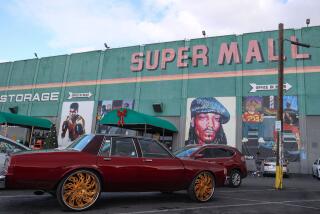Grocer Sells Brooklyn Store That Was Target of a Boycott
The clamoring on Church Avenue in Brooklyn has all but come to an end for Bong Jae Jang.
After weathering a 16-month boycott by black protesters, the embattled Korean-American owner of the Family Red Apple grocery in New York City sold his business this week, reportedly for a profit. Jang said Wednesday he plans to take a “brief vacation,” before opening a new market elsewhere in the city.
“I want to go back to a more private life, and get away from the zoo atmosphere that has surrounded this boycott,” Jang said in a statement issued from New York. “Then I want to get back to what I came to the United States to do: earn a living.”
Jang was the target of a boycott that began in January, 1990, when an African-American customer said she was attacked by store employees who accused her of stealing.
Immediately after the incident, black protesters began rallying in front of the shop, imploring people not to shop, and cursing those who entered. Another Korean-owned market across the street was also picketed when boycotters accused the owner of harboring Red Apple employees responsible for the alleged beating.
The protesters succeeded in warding off most of the stores’ clientele, even after a court restraining order was issued to keep protesters 50 feet from the entrances.
The antagonism brought out during the boycott came to epitomize a city fatigued by economic frustration, race baiting and occasional incidents of racially motivated violence. The confrontation also resonated in other American cities where immigrant Korean merchants have established businesses in ethnically mixed neighborhoods in recent years.
Jang said he was not pressured to leave the bustling business strip near the corner of Church and Flatbush avenues where he had done business for about three years. He said he had been looking to move to a larger market in a more affluent neighborhood since the beginning of the year.
But boycott organizers claimed victory. Principle organizer Robert C. (Sonny) Carson was not available for comment Wednesday, but several protesters who gathered in front of the market after newspapers published reports of the sale said they were satisfied Jang had left.
Criminal charges and a $6-million civil suit were filed last year against the grocer and his brother, Bong Ok Jang. The civil suit was filed by the alleged beating victim.
The Jangs denied the assault allegations and stood firm. With financial help from neighbors and Korean-American community associations across the country, the store survived.
The civil suit is pending, but a jury acquitted Jang’s brother of assault charges in January. Customers began to come back. Richard Izzo, Bong Jae Jang’s lawyer, said business had returned to pre-boycott levels.
Some protesters have urged that the boycott should continue. But organizers reiterated this week that only the businesses where customers are disrespected will be targeted--not all Korean-owned stores. On Wednesday, Red Apple grocery was undergoing renovation by the new owner, Myun Kwan Cha, a Korean immigrant.
To Jang, the issue of who scored a victory is not the primary concern, attorney Izzo said.
“All he wanted to do was sell and walk away quietly,” Izzo said. “But after characterizations of him as a battered and beaten man came out, he knew he had to say something. He understands that he is not just Bong Jae Jang any more. A lot of people look to him as something of a symbol.”
During Jang’s brief respite from business, he attended a Yankees game--his first--and relaxed in a local park, also a first, since he emigrated from Korea eight years ago, Izzo said. He has plans to go camping in the mountains.
“I have not quit,” Jang said in his statement. “I am simply moving on.”
More to Read
Inside the business of entertainment
The Wide Shot brings you news, analysis and insights on everything from streaming wars to production — and what it all means for the future.
You may occasionally receive promotional content from the Los Angeles Times.










